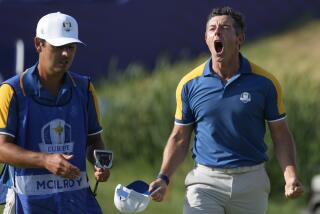This Is No Easy Ryder
- Share via
SUTTON COLDFIELD, England — Mark Calcavecchia sat in the sand, head in his hand and tears streaming down his face. Certain that he had just blown the 1991 Ryder Cup for the American team, he just wanted to be alone on the beach at Kiawah Island.
Later that afternoon, it was Bernhard Langer’s turn. He sobbed in the locker room after missing a five-footer against Hale Irwin that would have allowed Europe to keep the cup.
The Americans were the ones who ended up celebrating after winning the raucous “War By The Shore.” Emotions, though, were plenty raw on both sides after the gut-wrenching finish.
“There is no way I would ever wish what happened on that last hole to anyone,” Irwin said.
Playing in a Ryder Cup means standing up to pressures that can cause meltdowns on the course, and breakdowns off of it. Players whose heartbeats barely go up when there’s a $1 million purse at stake suddenly find their legs turning to jelly over the prospect of a three-footer with national pride on the line.
That promises to be no different at The Belfry, where the crowds won’t always applaud for the right reasons and where the definition of success and failure depends on which side of the ocean a 14-inch-tall gold chalice ends up.
There’s no real money involved, beyond expenses and a few dollars for charity. But players live with the constant reminder that their country and 11 other teammates are depending on them, something of a foreign concept in the week-to-week life of a tour player.
“You’ve got a fear of losing, rather than a nervousness about trying to win a U.S. Open or a Masters or a PGA,” Davis Love III said. “You don’t think about, ‘I don’t want to lose. I don’t want to finish second.’ It’s more, ‘What can I do to win this thing?’ In the Ryder Cup, you don’t want to lose a match. You don’t want to lose a hole. You don’t want to be on a losing team.”
It’s those kind of thoughts that can make players look more at times like Jean Van de Velde playing the 18th hole in the British Open than 24 of the best golfers in the world.
In 1991, Calcavecchia stood on the 15th tee four-up, only to collapse in an oceanful of bad shots that gave Colin Montgomerie a tie at Kiawah Island. If Langer had made his putt and Europe kept the cup, Calcavecchia would have long been vilified for losing the Ryder Cup on home soil.
That was the fate of this year’s captain, Curtis Strange, who won two U.S. Opens but can’t escape the scars from the 1995 Ryder Cup when he was three up with four to play, only to lose the deciding match to Nick Faldo.
As the U.S. team sat in stunned silence during the awards ceremony, Strange buried his brow in his hand.
“I’ll deserve what I get in the press over the next few days,” Strange said.
It wasn’t just the press.
“Bogey, bogey, bogey ... Ryder Cup choker,” mocked a fan at a tournament a few months later.
Strange was an experienced Ryder Cup player by then, accustomed to the pressure.
David Duval wasn’t in 1999 when he and Phil Mickelson teed off in an alternate shot match on Thursday in his first Ryder Cup. Behind his wraparound sunglasses, he was shaking.
“Phil hit first, and he hit in the rough,” Duval said. “If I had hit first, it would have been worse.”
Darren Clarke had the same feeling in 1997 when he stood on the first tee at Valderamma.
“I teed it up a little bit higher than usual to make sure I made contact on the way down,” Clarke said.
Even Tiger Woods--whose Ryder Cup record is a not-so-Tigerlike 3-6-1--isn’t immune. After his first Ryder Cup match in 1997 at Valderamma, Woods told his then-coach Butch Harmon he had never been so nervous in his life.
Jesper Parnevik says he loves every moment. Of course, no one has ever accused Parnevik of living in the same world as his fellow players.
“I don’t care who wins. It’s the atmosphere I like,” Parnevik said. “Just the fact guys are pumping their fists and screaming and jumping on the first hole Friday morning, that’s what makes it special. You never see a guy do it out here, ever. Maybe on the last hole Sunday when they have a chance to win.
“There, every hole is like playing a major to win.”
More to Read
Go beyond the scoreboard
Get the latest on L.A.'s teams in the daily Sports Report newsletter.
You may occasionally receive promotional content from the Los Angeles Times.










